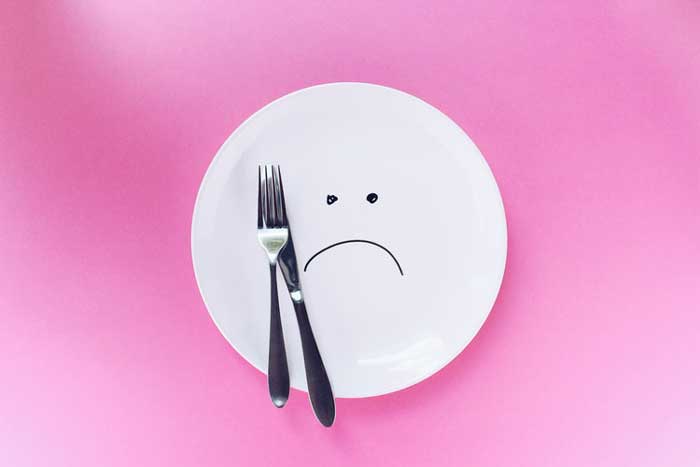The feeling of hunger is the way for your brain to demand food to generate useful energy. But if your stomach wants more even after an excellent treat, you are most likely to have metabolic disorders, which occur for several reasons:
 1. You consume too many carbohydrates
1. You consume too many carbohydrates
It’s not about the fact that it is advisable to exclude carbohydrates from the diet, as in the ketogenic diet. Sugary foods and refined carbohydrates are quickly digested and absorbed by the digestive system. As a result, the stomach feels empty just after eating – and you feel hungry again. The best way to avoid this situation is to focus on healthy and nutritious foods.
2. You count calories not only in the diet and reduce your nutrition
The fact that certain beverages contain few calories also means that they do not contain any significant nutrients. In this case, counting calories is not the most effective way to understand what it is worth to drink and eat. For example, it is much more useful to drink a cup of fruit juice than a diet cola.
3. You have stress
With an increased level of cortisol, there comes the desire to consume as much food as possible, especially “convenient” foods like fast food. The best way to deal with this stress reaction will be to find real solutions to the problem. You can communicate with someone you trust, start a diary or even make an appointment with a therapist for a consultation.
If you do not get enough rest and sleep, the level of stress increases the number of free radicals, and they attack the cells at the molecular level and interfere with the normal functioning of the body. This makes you feel hungry and stressed, so make sure you have enough sleep.
4. You are thirsty

Dehydration violates all the signals from the brain. Thus, when thirsty, you are subconsciously drawn to the refrigerator instead of water. Make sure that you drink enough water per day, and very soon you will get rid of not only the constant feeling of hunger, but also the problems with skin, hair and nails.
5. You have problems with the thyroid gland
Such hormonal disorders as hyperthyroidism cause various problems associated with weight loss and hunger, especially in women. To test yourself, you can visit an endocrinologist as well as change your lifestyle, pay attention to nutrition and regular training.
6. You consume little protein
Every day your diet should contain at least one source of protein that is the building block of your body. The cells of the whole body are regularly destroyed, and if you do not replenish them regularly, you will quickly feel weak and tired. In order to replenish the level of protein, add to your food fish, mushrooms, chicken breasts, beans, legumes or broccoli every day.
7. You do not have enough fiber

Fiber and complex carbohydrates require a lot of time for digestion, which leads to an increase in the saturation level. Add more fruits, vegetables, legumes and whole grains, while reducing the consumption of refined carbohydrates.
8. You avoid useful fats
Useful fats are an integral part of the cell membrane structure. They reduce inflammation in the body and help its various functions. They are contained in olive oil, avocado, flax seeds, sunflowers, walnuts, almonds and pistachios, so do not forget to add them to your diet.
9. You are distracted while eating
If you continue to surf social networks, watch videos on YouTube, but do not look at your plate – you do not send a signal to the brain about what you really ate. A quick dinner also prevents you from understanding how much you actually ate. The brain does not receive a visual signal and can eventually make you feel hungry even after a heavy and nutritious meal. Eat slowly and chew properly, and this problem will not be raised.
10. You have leptin resistance
Leptin is a hormone that is secreted by fat cells and prevents overeating. But when you eat too much and accumulate fat in your body, your brain stops responding to leptin secreted by fat cells and leptin resistance develops. To check your stability, it is worth visiting the endocrinologist.
11. You have signs of diabetes

A constant feeling of hunger can also mean that your body is resistant to insulin, which is one of the causes of diabetes. Insulin is a hormone that is secreted by beta cells of the pancreas and helps to carry glucose in cells, where it turns into useful energy. If you overeat, this can lead to the emergence of insulin resistance, resulting in glucose not being transported to all cells of the body. When this happens, your brain sends a signal to eat more, although in reality, the stomach is already full enough.
It is easy to check if you have diabetes – a blood test for glucose and a therapist’s consultation are enough.
12. You eat at different times
Even if you are very busy – this does not mean that you can skip your meals. Try nutritious cocktails or simple snacks that you can take with you – you only need a couple of minutes to quench your hunger. If you eat unevenly and at different times, your brain and body go to a state of saving energy, and you experience fatigue and stress. As a result, you start to overeat.
13.You are pregnant
If you experience a constant feeling of hunger, mild nausea and an increased sensitivity of the breasts – you are likely to be pregnant. Most women experience severe hunger in the first trimester, so it’s worth seeing a doctor to check this.
14. You train too much

Rebuilding your body and the muscle mass leads to increased inflammations and stressful reactions of the body. It can easily lead to a reduction in the energy level. In this situation, many begin to eat more to make up for energy and feel a little better. You should carry out mixed training, paying special attention to cardio and power workouts. Make sure that you have no more than 6 hours of workouts a week.
15. You take medicine
Some drugs, such as antidepressants, allergy medications, birth control and other hormonal drugs, can make you go crazy with hunger. If this sensation persists for several days, this is a serious reason to discuss changing the drug with a doctor. Frequent use of alcohol can also lead to such an effect – the body is deprived of the necessary hydration and resorts to hunger, signaling the need to drink water. Yet, you interpret this signal incorrectly under alcoholic intoxication.











